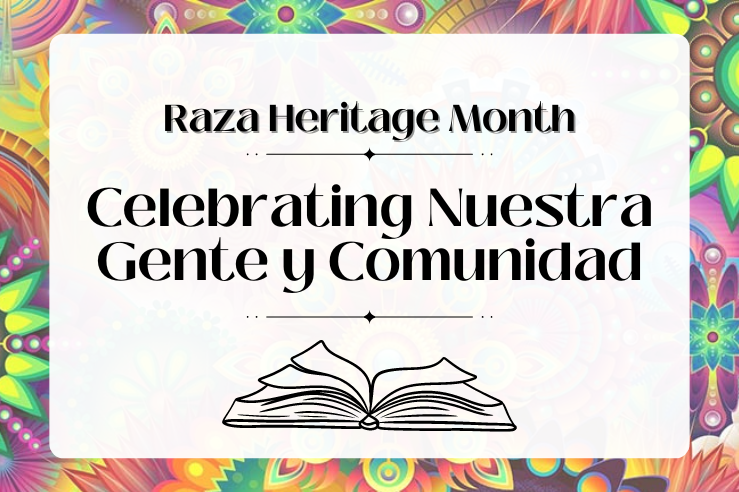Throughout September 15 to October 15, the CSUN University Library observes Raza Heritage Month: Celebrating Nuestra Comunidad y Gente and honors the contributions of Latinx Americans. During this time, we celebrate the lived experiences and cultural history of those with ancestries typically from Mexico, the Caribbean, Central America, and South America. The period encompasses the dates on which several countries in the South and Central America celebrate their respective Independence days.
Below, you will find a selection of eBooks freely available through the University Library that explore the experiences of Latinx communities with a spotlight on LGBTQIA+ authors, narratives, and scholarship. For even more books uplifting Queer Latinx voices and experiences, be sure to visit our book display in the library’s lobby on the First Floor. At the end of this blog post, you will also find information about Library events that uplift Latinx perspectives, authorship, and creativity!
Recommended eBooks
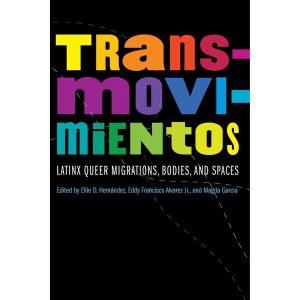
“Within a trans-embodied framework, this anthology identifies transmovimientos as the creative force or social mechanism through which queer, trans, and gender nonconforming Latinx communities navigate their location and calibrate their consciousness. This anthology unveils a critical perspective with the emphasis on queer, trans, and gender nonconforming communities of immigrants and social dissidents who reflect on and write about diaspora and migratory movements while navigating geographical and embodied spaces across gendered and racialized contexts, all crucial elements of the trans-movements taking place in the United States.”
Conjured Bodies : Queer Racialization in Contemporary Latinidad (2022) by Laura Grappo
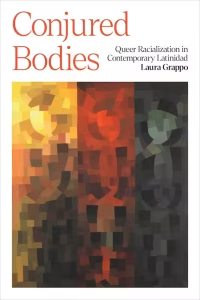
“Many scholars have argued that the uncertainty surrounding Latinidad is emancipatory: by queering race—by upsetting assumptions about categories of human difference—Latinidad destabilizes the architecture of oppression. But Laura Grappo is less sanguine. She draws on case studies including the San Antonio Four (Latinas who were wrongfully accused of child sex abuse); the football star Aaron Hernandez’s incarceration and suicide; Lorena Bobbitt, the headline-grabbing Ecuadorian domestic-abuse survivor; and controversies over the racial identities of public Latinx figures to show how media institutions and state authorities deploy the ambiguities of Latinidad in ways that mystify the sources of Latinx political and economic disadvantage. With Latinidad always in a state of flux, it is all too easy for the powerful to conjure whatever phantoms serve their interests.”
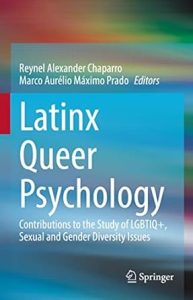
“This book brings together studies that contribute to the emergence of a latinx queer psychology. LGBTQ+ studies have gradually included the perspective of sexual and gender diversity, but they have been predominantly elaborated from North American and European perspectives. This book focuses on different understandings and practices developed by Latin American researchers that contribute to a broader application of psychological knowledge in LGBTQ+ studies, as well as sexual and gender diversity issues, but goes beyond the region by also incorporating chapters written by European and North American authors influenced by latinx perspectives.”
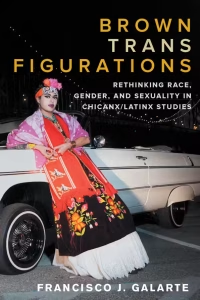
“Within queer, transgender, and Latinx and Chicanx cultural politics, brown transgender narratives are frequently silenced and erased. Brown trans subjects are treated as deceptive, unnatural, nonexistent, or impossible, their bodies, lives, and material circumstances represented through tropes and used as metaphors. Restoring personhood and agency to these subjects, Francisco J. Galarte advances “brown trans figuration” as a theoretical framework to describe how transness and brownness coexist within the larger queer, trans, and Latinx historical experiences.”
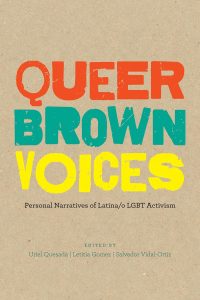 “In the last three decades of the twentieth century, LGBT Latinas/os faced several forms of discrimination. The greater Latino community did not often accept sexual minorities, and the mainstream LGBT movement expected everyone, regardless of their ethnic and racial background, to adhere to a specific set of priorities so as to accommodate a “unified” agenda. To disrupt the cycle of sexism, racism, and homophobia that they experienced, LGBT Latinas/os organized themselves on local, state, and national levels, forming communities in which they could fight for equal rights while simultaneously staying true to both their ethnic and sexual identities. Yet histories of LGBT activism in the 1970s, 1980s, and 1990s often reduce the role that Latinas/os played, resulting in misinformation, or ignore their work entirely, erasing them from history. Queer Brown Voices is the first book published to counter this trend, documenting the efforts of some of these LGBT Latina/o activists.”
“In the last three decades of the twentieth century, LGBT Latinas/os faced several forms of discrimination. The greater Latino community did not often accept sexual minorities, and the mainstream LGBT movement expected everyone, regardless of their ethnic and racial background, to adhere to a specific set of priorities so as to accommodate a “unified” agenda. To disrupt the cycle of sexism, racism, and homophobia that they experienced, LGBT Latinas/os organized themselves on local, state, and national levels, forming communities in which they could fight for equal rights while simultaneously staying true to both their ethnic and sexual identities. Yet histories of LGBT activism in the 1970s, 1980s, and 1990s often reduce the role that Latinas/os played, resulting in misinformation, or ignore their work entirely, erasing them from history. Queer Brown Voices is the first book published to counter this trend, documenting the efforts of some of these LGBT Latina/o activists.”
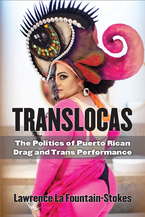
“Translocas focuses on drag and transgender performance and activism in Puerto Rico and its diaspora. Arguing for its political potential, Lawrence La Fountain-Stokes explores the social and cultural disruptions caused by Latin American and Latinx “locas” (effeminate men, drag queens, transgender performers, and unruly women) and the various forms of violence to which queer individuals in Puerto Rico and the U.S. are subjected…The author also pays careful attention to transgender experience, highlighting how trans activists and performers mold their bodies, promote social change, and create community in a context that oscillates between glamour and abjection.”
Black dove : Mama, Mi’jo, and Me (2016) by Ana Castillo
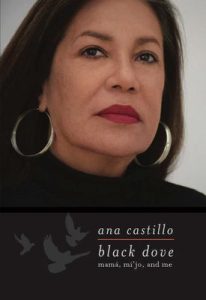
Black Dove: Mamá, Mi’jo, and Me looks at what it means to be a single, brown, feminist parent in a world of mass incarceration, racial profiling, and police brutality. Through startling humor and love, Castillo weaves intergenerational stories traveling from Mexico City to Chicago. And in doing so, she narrates some of America’s most heated political debates and urgent social injustices through the oft-neglected lens of motherhood and family.
![[Un]framing the "bad woman" : Sor Juana, Malinche, Coyolxauhqui, and other rebels with a cause (2014) by Alicia Gaspar de Alba](https://library.csun.edu/blogs/cited/wp-content/uploads/sites/4/2024/09/AG-200x300.jpg)
“In [Un]Framing the “Bad Woman, Gaspar de Alba revisits and expands several of her published articles and presents three new essays to analyze how specific brown/female bodies have been framed by racial, social, cultural, sexual, national/regional, historical, and religious discourses of identity—as well as how Chicanas can be liberated from these frames. Employing interdisciplinary methodologies of activist scholarship that draw from art, literature, history, politics, popular culture, and feminist theory, she shows how the “bad women” who interest her are transgressive bodies that refuse to cooperate with patriarchal dictates about what constitutes a “good woman” and that queer/alter the male-centric and heteronormative history, politics, and consciousness of Chicano/Mexicano culture. By “unframing” these bad women and rewriting their stories within a revolutionary frame, Gaspar de Alba offers her compañeras and fellow luchadoras empowering models of struggle, resistance, and rebirth.”
When My Brother Was an Aztec (2012) by Natalie Diaz
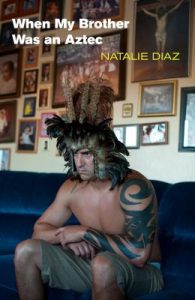
“Natalie Diaz’s debut collection, When My Brother Was an Aztec, foregrounds the particularities of family dynamics and individual passion against the backdrop of the mythological intensity of tribal life and a deeply rooted cultural history. In these distinctively voiced poems, a sister struggles with a brother’s addiction to meth, while everyone, from Antigone and Houdini to Huitzilopochtli and Jesus, is invited to hash it out. By turns darkly humorous and sensual, Diaz’s poems gather imagery and language as readily as they illuminate the intimate and engage the communal. Whether Diaz tells of a son stealing the family’s lightbulbs, a father pushing his Sisyphean heart to jail to post bail yet again, or a woman inhabiting the embrace of her lover, When My Brother Was an Aztec marks an exciting poetic debut.”
Events in the Library
For our 2024 observation, we have put the spotlight on Queer Latin(x) authors, narratives and scholarship. Our University Library is proud to commemorate the many contributions of LGBTQIA+ Latinx Americans, particularly within education, literature, art, activism, and groundbreaking research and discoveries.
The CSUN University Library invites you to explore the following programming for Raza Heritage Month:
September 23, 11:30am – 1:00pm, University Library: Jack & Florence Ferman Presentation Room
Join us for a compelling event about Dr. Baugh’s exploration of the rich environmental knowledge and deep values rooted in Spanish-speaking Catholic families in the U.S. This thought-provoking conversation will include a dynamic Q&A with the new Director of the Institute for Sustainability, fostering dialogue on the intersection of culture, faith, and environmental stewardship. Co-sponsored by CSUN Sustainability and CSUN Forestry.
The 12th Annual Banned Books Readout with Pizza
September 25, 1:00pm – 2:15pm, University Library: Jack & Florence Ferman Presentation Room
Featuring keynote speaker, Rubén Martínez, who will speak on “The Art of Memory: Writing Ourselves Back into History.” CSUN Journalism Professor David Blumenkrantz’s J480 History of American News Media class will give dramatic readings. Rubén is a writer, teacher and performer. He holds the Fletcher Jones Chair in Literature and Writing at Loyola Marymount and serves the English, Chicana/o and Latina/Latino Studies and Journalism departments. He is the author of several books, including Desert America: A Journey Across Our Most Divided Landscape and Crossing Over: A Mexican Family on the Migrant Trail. He is also the co-creator of Little Central America, 1984, a theatrical performance about the lives and times of the Sanctuary Movement. Co-sponsored by CSUN Journalism, CSUN Pride Center, and the Queer Studies Program.
September 26, 5:00pm – 6:30pm, University Library: Jack & Florence Ferman Presentation Room
Legendary drag queen Barbra Wyre is our special guest for an evening lotería. We invite you to play this classic game of chance and enjoy a night of community, prizes, drag performances, and light snacks. Co-sponsored by CSUN Pride Center and CSUN Act Now.


